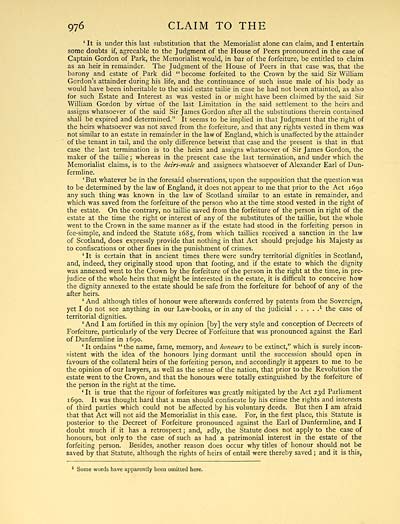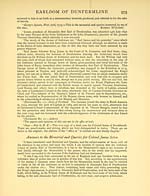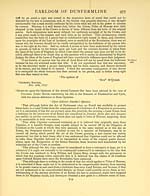Download files
Complete book:
Individual page:
Thumbnail gallery: Grid view | List view

976
CLAIM TO THE
' It is under this last substitution that the Memorialist alone can claim, and I entertain
some doubts if, agreeable to the Judgment of the House of Peers pronounced in the case of
Captain Gordon of Park, the Memorialist would, in bar of the forfeiture, be entitled to claim
as an heir in remainder. The Judgment of the House of Peers in that case was, that the
barony and estate of Park did "become forfeited to the Crown by the said Sir William
Gordon's attainder during his life, and the continuance of such issue male of his body as
would have been inheritable to the said estate tailie in case he had not been attainted, as also
for such Estate and Interest as was vested in or might have been claimed by the said Sir
William Gordon by virtue of the last Limitation in the said settlement to the heirs and
assigns whatsoever of the said Sir James Gordon after all the substitutions therein contained
shall be expired and determined." It seems to be implied in that Judgment that the right of
the heirs whatsoever was not saved from the forfeiture, and that any rights vested in them was
not similar to an estate in remainder in the law of England, which is unaffected by the attainder
of the tenant in tail, and the only difference betwixt that case and the present is that in that
case the last termination is to the heirs and assigns whatsoever of Sir James Gordon, the
maker of the tailie ; whereas in the present case the last termination, and under which the
Memorialist claims, is to the heirs-male and assignees whatsoever of Alexander Earl of Dun-
fermline.
'But whatever be in the foresaid observations, upon the supposition that the question was
to be determined by the law of England, it does not appear to me that prior to the Act 1690
any such thing was known in the law of Scotland similar to an estate in remainder, and
which was saved from the forfeiture of the person who at the time stood vested in the right of
the estate. On the contrary, no taillie saved from the forfeiture of the person in right of the
estate at the time the right or interest of any of the substitutes of the taillie, but the whole
went to the Crown in the same manner as if the estate had stood in the forfeiting person in
fee-simple, and indeed the Statute 1685, from which taillies received a sanction in the law
of Scotland, does expressly provide that nothing in that Act should prejudge his Majesty as
to confiscations or other fines in the punishment of crimes.
'It is certain that in ancient times there were sundry territorial dignities in Scotland,
and, indeed, they originally stood upon that footing, and if the estate to which the dignity
was annexed went to the Crown by the forfeiture of the person in the right at the time, in pre-
judice of the whole heirs that might be interested in the estate, it is difficult to conceive how
the dignity annexed to the estate should be safe from the forfeiture for behoof of any of the
after heirs.
' And although titles of honour were afterwards conferred by patents from the Sovereign,
yet I do not see anything in our Law-books, or in any of the judicial 1 the case of
territorial dignities.
'And I am fortified in this my opinion [by] the very style and conception of Decreets of
Forfeiture, particularly of the very Decree of Forfeiture that was pronounced against the Earl
of Dunfermline in 1690.
'It ordains "the name, fame, memory, and honours to be extinct," which is surely incon-
sistent with the idea of the honours lying dormant until the succession should open in
favours of the collateral heirs of the forfeiting person, and accordingly it appears to me to be
the opinion of our lawyers, as well as the sense of the nation, that prior to the Revolution the
estate went to the Crown, and that the honours were totally extinguished by the forfeiture of
the person in the right at the time.
' It is true that the rigour of forfeitures was greatly mitigated by the Act 23d Parliament
1690. It was thought hard that a man should confiscate by his crime the rights and interests
of third parties which could not be affected by his voluntary deeds. But then I am afraid
that that Act will not aid the Memorialist in this case. For, in the first place, this Statute is
posterior to the Decreet of Forfeiture pronounced against the Earl of Dunfermline, and I
doubt much if it has a retrospect ; and, 2dly, the Statute does not apply to the case of
honours, but only to the case of such as had a patrimonial interest in the estate of the
forfeiting person. Besides, another reason does occur why titles of honour should not be
saved by that Statute, although the rights of heirs of entail were thereby saved ; and it is this,
Some words have apparently been omitted here.
CLAIM TO THE
' It is under this last substitution that the Memorialist alone can claim, and I entertain
some doubts if, agreeable to the Judgment of the House of Peers pronounced in the case of
Captain Gordon of Park, the Memorialist would, in bar of the forfeiture, be entitled to claim
as an heir in remainder. The Judgment of the House of Peers in that case was, that the
barony and estate of Park did "become forfeited to the Crown by the said Sir William
Gordon's attainder during his life, and the continuance of such issue male of his body as
would have been inheritable to the said estate tailie in case he had not been attainted, as also
for such Estate and Interest as was vested in or might have been claimed by the said Sir
William Gordon by virtue of the last Limitation in the said settlement to the heirs and
assigns whatsoever of the said Sir James Gordon after all the substitutions therein contained
shall be expired and determined." It seems to be implied in that Judgment that the right of
the heirs whatsoever was not saved from the forfeiture, and that any rights vested in them was
not similar to an estate in remainder in the law of England, which is unaffected by the attainder
of the tenant in tail, and the only difference betwixt that case and the present is that in that
case the last termination is to the heirs and assigns whatsoever of Sir James Gordon, the
maker of the tailie ; whereas in the present case the last termination, and under which the
Memorialist claims, is to the heirs-male and assignees whatsoever of Alexander Earl of Dun-
fermline.
'But whatever be in the foresaid observations, upon the supposition that the question was
to be determined by the law of England, it does not appear to me that prior to the Act 1690
any such thing was known in the law of Scotland similar to an estate in remainder, and
which was saved from the forfeiture of the person who at the time stood vested in the right of
the estate. On the contrary, no taillie saved from the forfeiture of the person in right of the
estate at the time the right or interest of any of the substitutes of the taillie, but the whole
went to the Crown in the same manner as if the estate had stood in the forfeiting person in
fee-simple, and indeed the Statute 1685, from which taillies received a sanction in the law
of Scotland, does expressly provide that nothing in that Act should prejudge his Majesty as
to confiscations or other fines in the punishment of crimes.
'It is certain that in ancient times there were sundry territorial dignities in Scotland,
and, indeed, they originally stood upon that footing, and if the estate to which the dignity
was annexed went to the Crown by the forfeiture of the person in the right at the time, in pre-
judice of the whole heirs that might be interested in the estate, it is difficult to conceive how
the dignity annexed to the estate should be safe from the forfeiture for behoof of any of the
after heirs.
' And although titles of honour were afterwards conferred by patents from the Sovereign,
yet I do not see anything in our Law-books, or in any of the judicial 1 the case of
territorial dignities.
'And I am fortified in this my opinion [by] the very style and conception of Decreets of
Forfeiture, particularly of the very Decree of Forfeiture that was pronounced against the Earl
of Dunfermline in 1690.
'It ordains "the name, fame, memory, and honours to be extinct," which is surely incon-
sistent with the idea of the honours lying dormant until the succession should open in
favours of the collateral heirs of the forfeiting person, and accordingly it appears to me to be
the opinion of our lawyers, as well as the sense of the nation, that prior to the Revolution the
estate went to the Crown, and that the honours were totally extinguished by the forfeiture of
the person in the right at the time.
' It is true that the rigour of forfeitures was greatly mitigated by the Act 23d Parliament
1690. It was thought hard that a man should confiscate by his crime the rights and interests
of third parties which could not be affected by his voluntary deeds. But then I am afraid
that that Act will not aid the Memorialist in this case. For, in the first place, this Statute is
posterior to the Decreet of Forfeiture pronounced against the Earl of Dunfermline, and I
doubt much if it has a retrospect ; and, 2dly, the Statute does not apply to the case of
honours, but only to the case of such as had a patrimonial interest in the estate of the
forfeiting person. Besides, another reason does occur why titles of honour should not be
saved by that Statute, although the rights of heirs of entail were thereby saved ; and it is this,
Some words have apparently been omitted here.
Set display mode to:
![]() Universal Viewer |
Universal Viewer | ![]() Mirador |
Large image | Transcription
Mirador |
Large image | Transcription
Images and transcriptions on this page, including medium image downloads, may be used under the Creative Commons Attribution 4.0 International Licence unless otherwise stated. ![]()
| Histories of Scottish families > History of the family of Seton during eight centuries > Volume 2 > (436) |
|---|
| Permanent URL | https://digital.nls.uk/96852054 |
|---|
| Attribution and copyright: |
|
|---|---|
| Description | A selection of almost 400 printed items relating to the history of Scottish families, mostly dating from the 19th and early 20th centuries. Includes memoirs, genealogies and clan histories, with a few produced by emigrant families. The earliest family history goes back to AD 916. |
|---|

